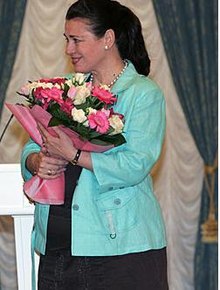Loading AI tools
Russian singer (1946–2010) From Wikipedia, the free encyclopedia
Valentina Vasilevna Tolkunova (Russian: Валенти́на Васи́льевна Толкуно́ва, 12 July 1946 – 22 March 2010) was a Soviet and Russian singer and was bestowed the title of Honored Artist of RSFSR (1979) and People’s Artist of the RSFSR (1987). Her performances exhibited a kindhearted mood and sincerity, and her voice was noted for its clarity.[1][2][3]
Valentina Tolkunova Валентина Толкунова | |
|---|---|
 Valentina Tolkunova in 1972 | |
| Born | Valentina Vasilevna Tolkunova 12 July 1946 |
| Died | 22 March 2010 (aged 63) |
| Resting place | Troyekurovskoye Cemetery, Moscow |
| Alma mater | Moscow State Art and Cultural University |
| Title | People’s Artist of the RSFSR (1987) |
| Awards |
|
| Musical career | |
| Origin | Moscow, Soviet Union |
| Genres | Pop, Jazz |
| Occupation | Singer |
| Years active | 1966–2010 |
| Signature | |
 | |

At age 18, Valentina Tolkunova entered Moscow State Art and Cultural University. In 1966, she became a member of Yury Saulsky's jazz band VIO-66 as a soloist and jazz singer. In 1971, she graduated from the Gnessin State Musical College and recorded songs for the TV series Day by Day. The year 1972 was Tolkunova's breakthrough year, due to a noted performance of songs, and marked the beginning of a successful career in radio and TV. In 1973, she began a busy collaboration with the Moscow Philharmonic Concert Association (Moskonzert), and in 1989 she founded and became the director of her own theatre. Over a thirty-year recording career, Valentina Tolkunova released at least thirteen albums. She also won many awards in Soviet republics and was a 23-time winner of the "Song of the Year" competition on television.[4][5]
On 16 February 2010, Tolkunova became ill during a concert in Mogilev, Belarus, and went to a local hospital where she was diagnosed with brain tumor before being transferred to the Botkin Clinic in Moscow. On 22 March, she went into a coma and died two hours later of a brain tumor.[6]
She was married to Yury Saulsky for 5 years, ending in divorce.[1][2]
Seamless Wikipedia browsing. On steroids.
Every time you click a link to Wikipedia, Wiktionary or Wikiquote in your browser's search results, it will show the modern Wikiwand interface.
Wikiwand extension is a five stars, simple, with minimum permission required to keep your browsing private, safe and transparent.